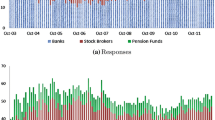Abstract
The Fisher effect maintains that movements in short-term interest rates largely reflect changes in expected inflation. Since expected inflation is subject to error, we ask whether interest rates move in response to over- and under-predictions of inflation. In answering, we measure expected inflation by the consumers’ forecast of inflation derived from the Michigan Surveys of Consumers (MSC). Our findings for 1978–2013 indicate that the MSC inflation forecasts were unbiased, efficient, and directionally accurate. For 1978–2007, (i) interest rates moved downward (upward) in response to MSC over-predictions (under-predictions) of inflation, and (ii) MSC inflation forecast errors had directional predictability for interest rates. However, no link between interest rate movements and MSC inflation forecast errors is detected for 2008–2013 when monetary policy kept short-term interest rates unusually low.

Similar content being viewed by others
Notes
The data on MSC inflation forecasts are available on the Michigan Surveys of Consumers website. The CPI and interest rate data are all available on the Federal Reserve Bank of St. Louis website.
References
Ang A, Bekaert G, Wei M (2007) Do macro variables, asset markets, or surveys forecast inflation better? J Monet Econ 54:1163–1212
Baghestani H (1992) On the formation of expected inflation under various conditions: some survey evidence. J Bus 65:281–293
Berenson ML, Levine DM, Rindskopf D (1988) Applied statistics: a first course. Prentice Hall, New York
De Bondt WF, Bange MM (1992) Inflation forecast errors and time variation in term premia. J Financ Quant Anal 27:479–496
Fair RC, Shiller RJ (1990) Comparing information in forecasts from econometric models. Am Econ Rev 80:375–389
Kaliva K (2008) The fisher effect, survey data and time-varying volatility. Empir Econ 35:1–10
Koustas Z, Serletis A (1999) On the fisher effect. J Monet Econ 44:195–215
Kwiatkowski D, Phillips PCB, Schmidt P, Shin Y (1992) Testing the null hypothesis of stationarity against the alternative of a unit root. J Econ 54:159–178
Mishkin FS (1992) Is the fisher effect for real? A reexamination of the relationship between inflation and interest rates. J Monet Econ 30:195–215
Sinclair TM, Stekler HO, Kitzinger L (2010) Directional forecasts of GDP and inflation: a joint evaluation with an application to federal reserve predictions. Appl Econ 42:2289–2297
Author information
Authors and Affiliations
Corresponding author
Rights and permissions
About this article
Cite this article
Baghestani, H. Interest rate movements and US consumers’ inflation forecast errors: is there a link?. J Econ Finan 40, 623–630 (2016). https://doi.org/10.1007/s12197-016-9354-x
Published:
Issue Date:
DOI: https://doi.org/10.1007/s12197-016-9354-x
Keywords
- Expected inflation
- Fisher effect
- Michigan surveys of consumers
- Directional predictability
- Forecast evaluation




